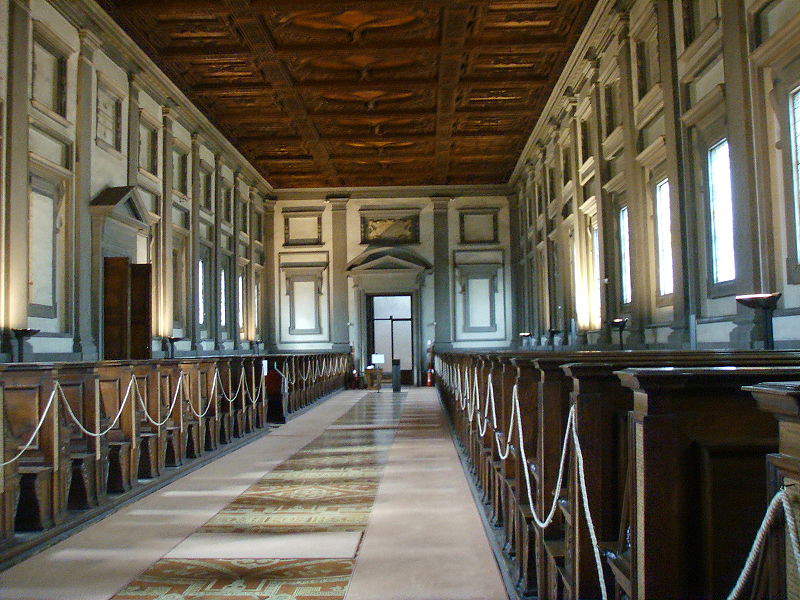All it took was a partially misrepresented Corriere della Sera article, a few catchy relaunches with shrewd choices of verbs and nouns to create alarmism, and the natural disinclination of most social media users to delve deeper, to give rise to a rumor that the Biblioteca Medicea Laurenziana in Florence is in danger of closure. Obviously, this is not the case: from what can be deduced even by simply reading carefully the above-mentioned article, there is “only” (in quotes because the situation is in any case serious, and yet largely solvable) a problem of renting premises that would concern exclusively the room where scholars consult the manuscripts, which the curia leases to the Ministry of Cultural Heritage. The problem lies in the fact that the ministry has stopped paying rent, and the curia is claiming its own space.
Of course, the affair is as unfortunate as ever, since the Laurenziana stands to libraries somewhat like the Uffizi or Palazzo Pitti stand to museums, and therefore it should not even be contemplated that the ministry decides to cut back on rents that guarantee the full functioning of one of the most important libraries in the world. Also because we are not talking about a room like there are others: the reading of ancient and precious manuscripts presupposes certain features and adequate security measures that can prevent the volumes from being damaged or stolen. But it is also true that the parties have already begun a dialogue (albeit without concrete answers from the ministry, we learn), the curia has granted the library the use of the space knowing that it would not receive anything from the ministry, the president of the Higher Council of Cultural Heritage, Giuliano Volpe, has promised that the attitude of the dicastery will change and that the issue will be addressed seriously, and the director general of libraries, Nicola Macrì, has said that on Monday there will be a meeting with the director of the Laurenziana, Ida Giovanna Rao, and has in any case assured that the study room will remain the Laurenziana’s property. In short: the whole thing will probably be resolved by a simple move of some offices, and just as likely the scholars (who in any case rightly fear the risk of inconvenience) will be able to continue their work undisturbed. And much less risk closing monumental spaces open to the public (it should be specified, since some are already despairing over the possibility of no longer seeing Michelangelo’s grand staircase: the problem, here, does not exist).
 |
| Biblioteca Medicea Laurenziana. Ph. Credit Francesco Bini |
At most, it is possible to consider this (ugly) story as an indication of the ministry’s consideration of libraries, although, for the sake of the record, it should also be pointed out that, between 2016 and 2017, the two National Central Libraries of Rome and Florence saw the arrival of new funds for ordinary operations, which allowed the two institutions to work in a more serene manner. Of course, the increase in resources has not erased some long-standing problems that the libraries have been dragging their feet on, and this is not only true for the central libraries (for certainly the injections of new resources have not helped to resolve certain issues, such as that of the volunteers at the National Central Library of Rome, who lack any protection but are necessary for the functioning of the institution): one thinks, clearly taking into consideration only state public libraries, of the risk of privatization of the Library of Archaeology and Art History in Palazzo Venezia (which also has problems related to space and staff, insufficient to meet its needs), of the closure of the reading room of the Biblioteca Estense, and in Pisa the affair of the headquarters of the Biblioteca Universitaria Pisana, closed since 2012, officially because of the earthquake, now borders on the ridiculous... in Emilia. And in general little has been gained by the amalgamation of several libraries (including the Braidense in Milan and the Palatina in Parma) to museums and museum centers, according to a logic that still eludes.
Trusting that the Laurenziana affair will be resolved in the best possible way (and we are almost certain of that: if it does not end with the hoped-for outcomes, all parties involved would have only to lose), we hope that it will contribute to the development of a serious reflection around the state of all our libraries: because if libraries are in a bad way, consequently the whole sector cannot but suffer as well, since libraries, indispensable tools for research and indispensable places for the education and development of citizenship, can be considered vital organs of a single body that cannot function well if any of its parts show negative symptoms.

The author of this article: Federico Giannini
Nato a Massa nel 1986, si è laureato nel 2010 in Informatica Umanistica all’Università di Pisa. Nel 2009 ha iniziato a lavorare nel settore della comunicazione su web, con particolare riferimento alla comunicazione per i beni culturali. Nel 2017 ha fondato con Ilaria Baratta la rivista Finestre sull’Arte. Dalla fondazione è direttore responsabile della rivista. Nel 2025 ha scritto il libro Vero, Falso, Fake. Credenze, errori e falsità nel mondo dell'arte (Giunti editore). Collabora e ha collaborato con diverse riviste, tra cui Art e Dossier e Left, e per la televisione è stato autore del documentario Le mani dell’arte (Rai 5) ed è stato tra i presentatori del programma Dorian – L’arte non invecchia (Rai 5). Al suo attivo anche docenze in materia di giornalismo culturale all'Università di Genova e all'Ordine dei Giornalisti, inoltre partecipa regolarmente come relatore e moderatore su temi di arte e cultura a numerosi convegni (tra gli altri: Lu.Bec. Lucca Beni Culturali, Ro.Me Exhibition, Con-Vivere Festival, TTG Travel Experience).
Warning: the translation into English of the original Italian article was created using automatic tools. We undertake to review all articles, but we do not guarantee the total absence of inaccuracies in the translation due to the program. You can find the original by clicking on the ITA button. If you find any mistake,please contact us.